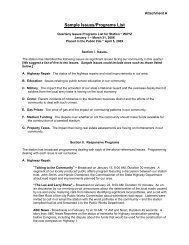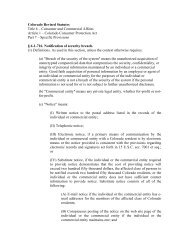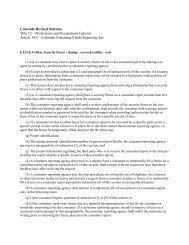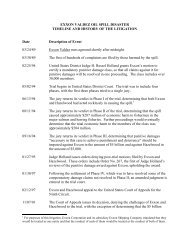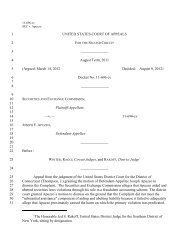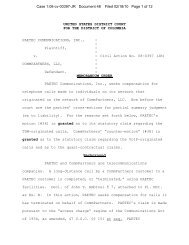QUANTA SERVICES INC, QUANTA SERVICES MANAGEMENT ...
QUANTA SERVICES INC, QUANTA SERVICES MANAGEMENT ...
QUANTA SERVICES INC, QUANTA SERVICES MANAGEMENT ...
Create successful ePaper yourself
Turn your PDF publications into a flip-book with our unique Google optimized e-Paper software.
Our use of fixed price contracts could adversely affect our business and results of operations.<br />
We currently generate a portion of our revenues under fixed price contracts. We also expect to generate a<br />
greater portion of our revenues under this type of contract in the future as larger projects, such as electric power<br />
and pipeline transmission build-outs and utility-scale solar facilities, become a more significant aspect of our<br />
business. We must estimate the costs of completing a particular project to bid for fixed price contracts. The actual<br />
cost of labor and materials, however, may vary from the costs we originally estimated, and we may bear the risk<br />
of certain unforeseen circumstances not included in our cost estimates for which we cannot obtain adequate<br />
compensation. These variations, along with other risks inherent in performing fixed price contracts, may cause<br />
actual revenue and gross profits for a project to differ from those we originally estimated and could result in<br />
reduced profitability or losses on projects. Depending upon the size of a particular project, variations from the<br />
estimated contract costs could have a significant impact on our operating results for any fiscal period.<br />
Our use of percentage-of-completion accounting could result in a reduction or elimination of previously<br />
reported profits.<br />
As discussed in Item 7. “Management’s Discussion and Analysis of Financial Condition and Results of<br />
Operations — Critical Accounting Policies” and in the notes to our consolidated financial statements included in<br />
Item 8. “Financial Statements and Supplementary Data”, a significant portion of our revenues are recognized<br />
using the percentage-of-completion method of accounting, utilizing the cost-to-cost method. This method is used<br />
because management considers expended costs to be the best available measure of progress on these contracts.<br />
This accounting method is generally accepted for fixed price contracts. The percentage-of-completion accounting<br />
practice we use results in our recognizing contract revenues and earnings ratably over the contract term in<br />
proportion to our incurrence of contract costs. The earnings or losses recognized on individual contracts are<br />
based on estimates of contract revenues, costs and profitability. Contract losses are recognized in full when<br />
determined to be probable and reasonably estimable, and contract profit estimates are adjusted based on ongoing<br />
reviews of contract profitability. Further, a substantial portion of our contracts contain various cost and<br />
performance incentives. Penalties are recorded when known or finalized, which generally occurs during the latter<br />
stages of the contract. In addition, we record cost recovery claims when we believe recovery is probable and the<br />
amounts can be reasonably estimated. Actual collection of claims could differ from estimated amounts and could<br />
result in a reduction or elimination of previously recognized earnings. In certain circumstances, it is possible that<br />
such adjustments could be significant.<br />
Our operating results can be negatively affected by weather conditions.<br />
We perform substantially all of our services in the outdoors. As a result, adverse weather conditions, such as<br />
rainfall or snow, may affect our productivity in performing our services or may temporarily prevent us from<br />
performing services. The effect of weather delays on projects that are under fixed price arrangements may be<br />
greater if we are unable to adjust the project schedule for such delays. A reduction in our productivity in any<br />
given period or our inability to meet guaranteed schedules may adversely affect the profitability of our projects,<br />
and as a result, our results of operations.<br />
We may be unsuccessful at generating internal growth.<br />
Our ability to generate internal growth will be affected by, among other factors, our ability to:<br />
• expand the range of services we offer to customers to address their evolving network needs;<br />
• attract new customers;<br />
• increase the number of projects performed for existing customers;<br />
• hire and retain qualified employees;<br />
• expand geographically, including internationally; and<br />
• address the challenges presented by stringent regulatory, environmental and permitting requirements<br />
and difficult economic or market conditions that may affect us or our customers.<br />
16




